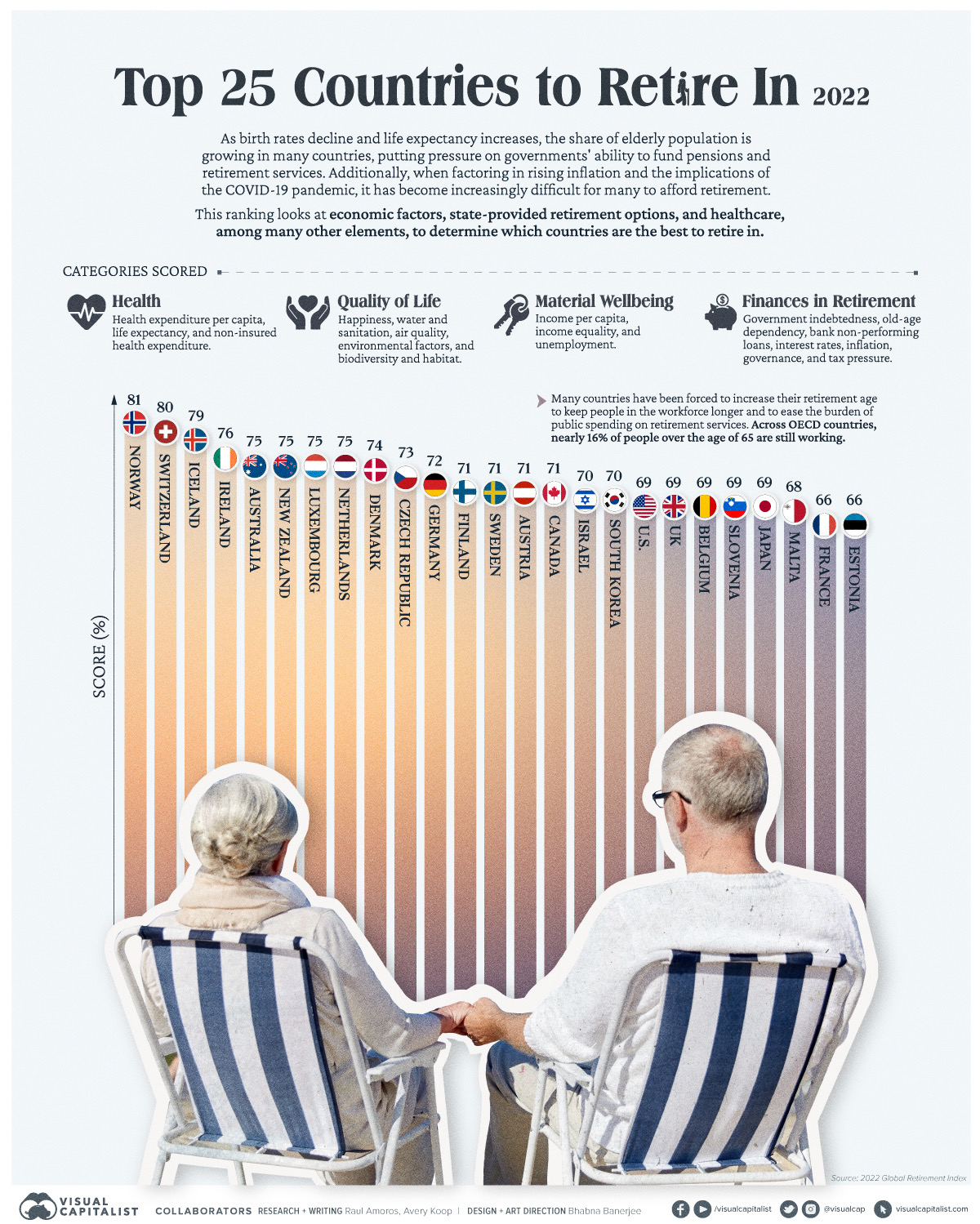Our global population is getting older. It is predicted by the OECD that by 2050, 30% of people worldwide will be aged 65 or over.
Some countries are well prepared to handle the increase in
the elderly demographic, while most of the countries are already feeling the
squeeze and stress with the challenges that come with a speedily aging
population.
In order to find out which countries are well prepared to
support their senior citizens, the infographic shows a detailed view. It uses
data from the 2022 Natixis Global Retirement Index to show the best countries
to retire in around the world, based on a number of different aspects that we
will look into.
What Factors Make a Country Retirement-Friendly?
The Global Retirement Index (GRI) studies retirement from a quite
quantitative perspective. The annual report looks at 44 different countries and
ranks them based on their retirement security. The index studies 18 factors in
total, which are grouped into four main categories:
Health: Health spend per capita, life expectancy, and
non-insured health spend.
Quality of Life: Happiness levels, water and sanitation, air
quality, other environmental factors, and biodiversity/habitat.
Material Wellbeing: Income per capita, income equality, and
employment levels.
Finances in Retirement: Government debt, old-age dependency,
interest rates, inflation, governance, tax pressure, and bank non-performing
loans.
With the use of these 18 metrics, a score from 0.01 to 1 is
determined for each country, which is then converted to a percentage figure.
The Top 10 Best Countries to Retire in:
With an overall score of 81%, Norway comes in at number one
as the most retirement-friendly country on the list.
|
Rank |
Country |
Score |
Health |
Quality of Life |
Material Wellbeing |
Finances in Retirement |
|
1 |
Norway |
81% |
91% |
87% |
79% |
69% |
|
2 |
Switzerland |
80% |
90% |
86% |
69% |
74% |
|
3 |
Iceland |
79% |
88% |
86% |
77% |
68% |
|
4 |
Ireland |
76% |
89% |
80% |
67% |
70% |
|
5 |
Australia |
75% |
88% |
77% |
66% |
72% |
|
6 |
New Zealand |
75% |
85% |
81% |
64% |
71% |
|
7 |
Luxembourg |
75% |
91% |
81% |
72% |
59% |
|
8 |
Netherlands |
75% |
89% |
80% |
78% |
56% |
|
9 |
Denmark |
74% |
86% |
88% |
76% |
54% |
|
10 |
Czech Republic |
73% |
76% |
68% |
84% |
64% |
Norway comes at the top of the list for many reasons. Firstly,
Norway scores the highest in the Health category, mainly because of its high
average life expectancy, which is 83 years old, or 9 years longer than the
global average.
Norway also scores the highest in the list for Governance. This
category is gauged by assessing country corruption levels, political stability,
and government effectiveness, and is in a three-way tie with Japan and
Luxembourg in the Health category.
The Future of Retirement:
As longevity rises and the retirement aged population continues
to increase worldwide, many countries are choosing to change their pension
policies in an effort to encourage people to stay in the workforce longer.
For instance, in 2018, people in the UK could claim their
State Pension once they turned 65. By 2028, the age requirement to claim
pension will be raised to 67 years.
Although, government is taking steps and working on pension policies
for retired people, this intervention may not be necessary as many people
around the world are already staying in the workforce beyond the traditional
retirement age (perhaps more out of necessity than choice).


